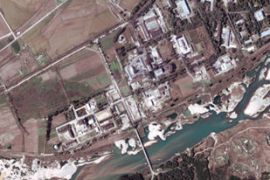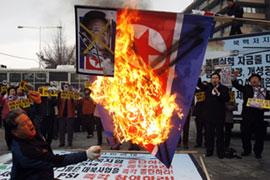N Korea agrees nuclear shutdown
Plan sees North Korea closing its main nuclear reactor within 60 days.

Published On 13 Feb 2007
Announcing the North’s agreement, Wu Dawei, the Chinese envoy to the talks, said North Korea would receive initial energy, food and other aid worth 50,000 tonnes worth of fuel oil for shutting down and sealing its main nuclear reactor at Yongbyon.
Once international inspectors had confirmed this and the reactor had been permanently disabled, another 950,000 tonnes of oil would be released he said.
 |
| North Korea’s nuclear programme has sparked protests in the South [Reuters] |
It is unclear who exactly would fund the aid, although a report in the New York Times earlier had suggested that the US, South Korea and China had agreed to share the cost.
The plan does not, however, appear to address what happens to North Korea’s existing stockpile of nuclear weapons – believed by some to number six or more.
Speaking to reporters earlier on Tuesday, Hill said the US government had backed the plan.
“This is only one phase of denuclearisation,” Hill said. “We’re not done.”
Condoleezza Rice, the US secretary of state, said the deal should be “seen as a message to Iran that the international community is able to bring together its resources”.
She said: “It’s a good story of international cooperation and of bringing together the right states to bring together the right set of incentives and disincentives.”
Marathon session
The draft agreement emerged after a marathon 16-hour negotiating session on the final scheduled day of the current round of talks.
| Your Views |
|
“North Korea is making a fool out of Bush and the Neocons. It is amazing that the more stubborn the North Koreans the more, they are rewarded by so many goodies“ B Humble, UK |
The six-nation talks first began over three years ago, with Tuesday’s agreement seen as the best hope yet for ending the crisis over North Korea’s weapons.
In October last year North Korea conducted its first test of a nuclear weapon, although experts remain divided over how successful the test actually was.
In September 2005, North Korea was promised energy aid and security guarantees in exchange for a pledge to abandon its nuclear programmes.
But talks on implementing that agreement stalled on other issues.
Under other elements of the new plan, working groups would be set up to discuss issues such as establishing a permanent peace settlement to replace the shaky cease-fire that ended the Korean War in 1953.
The six countries will hold the first meeting of the working groups within one month.
The plan also calls for North Korea and the US to begin talks aimed at resolving disputes and restarting diplomatic relations.
The US will initiate, under a separate bilateral forum, a process to remove North Korea from its list of state sponsors of terrorism within 60 days and begin the process of removing trade sanctions.
A new round of six-party talks will be held on March 19.
‘Wrong signal’
The agreement though is not without its critics.
In an interview with CNN on Monday John Bolton, the former US ambassador to the UN, said the plan sent “exactly the wrong signal to would-be proliferators around the world”.
He said it showed US weakness at a time when it was also challenging Iran over its own nuclear programme.
Bolton, who developed a reputation for taking a hardline stance during his time in the Bush administration, said North Korea should not be rewarded with massive shipments of energy for only partially dismantling its nuclear programme.
“This is a very bad deal,” he said.
Source: News Agencies